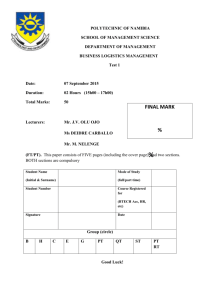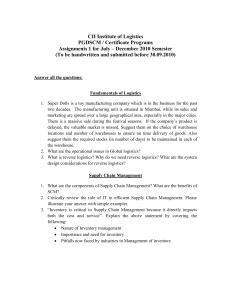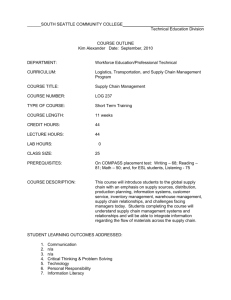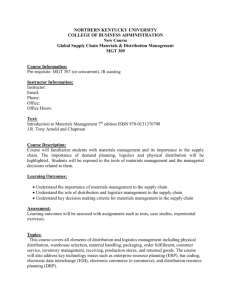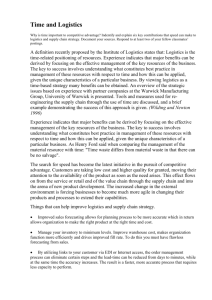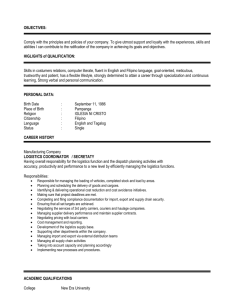LOGISTICS & SUPPLY CHAIN MANAGEMENT
advertisement
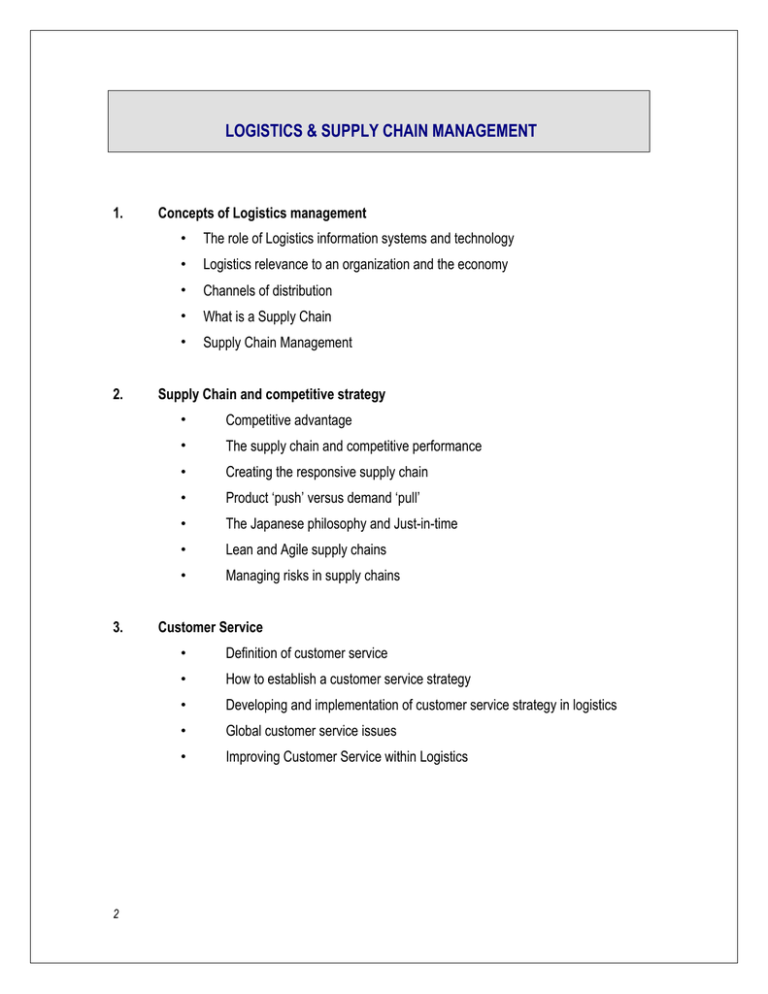
LOGISTICS & SUPPLY CHAIN MANAGEMENT 1. 2. 3. 2 Concepts of Logistics management • The role of Logistics information systems and technology • Logistics relevance to an organization and the economy • Channels of distribution • What is a Supply Chain • Supply Chain Management Supply Chain and competitive strategy • Competitive advantage • The supply chain and competitive performance • Creating the responsive supply chain • Product ‘push’ versus demand ‘pull’ • The Japanese philosophy and Just-in-time • Lean and Agile supply chains • Managing risks in supply chains Customer Service • Definition of customer service • How to establish a customer service strategy • Developing and implementation of customer service strategy in logistics • Global customer service issues • Improving Customer Service within Logistics 4. 5. 6. 7. 3 Logistics information systems and technology • The role of Logistics information systems and technology • Advanced order-processing systems • Inside sales/telemarketing • Electronic data interchange • Integrating order processing within the logistics information system. • Using information systems to support time-based competition. Procurement and Purchasing • The role of purchasing in the supply chain • Purchasing activities • Purchasing research and planning • Purchasing cost management • eProcurement • Managing supplier relationships • The Logistics Challenge – Paperless purchasing Inventory concepts and management • Basic inventory concepts • Basic inventory management • MRP systems • Financial aspects of inventory strategy • Inventory carrying costs • Improving inventory management • Impact of inventory reduction on corporate profit performance • Applying inventory reduction programmes Materials management 8. 9. 10. 11. • Scope of materials management • Forecasting • Total Quality Management • Administration and control of material flow • Materials management of spare-parts • Materials management in manufacturing Warehousing • The nature and importance of warehousing • Types of warehousing • Functions of warehousing • Facility development • Warehouse productivity measurement • Financial considerations of warehousing • The home delivery fulfillment challenge. Materials handling equipment • Materials handling and storage equipment • Warehousing in a just-tin-time environment • Warehouse management systems (WHS) • Packaging • Reverse logistics Logistics financial performance • Accurate cost data and total cost analysis • Limitations of current profitability reports • Cost justification of logistics systems Global logistics • 4 International distribution channel strategies 12. • Managing global logistics • Management of export shipment • Logistics characteristics of global markets Profit from Time • Strategic lead-time management • Time-Based competition • The concept of lead time • The lead-time gap AREAS OF DETAILED SPECIALIZATION AND EXPERTISE • Procurement and Purchasing Management • Warehouse Design • Warehouse Operations • MRP Systems – Operations Applications • Lean and Just-in-Time • Environmental and Reverse Logistics • Inventory Management and Control • Customer Service and Logistics OPERATIONS MANAGMENT 5 1. 2. 3. 4. 5. Managing Operations • Operations Management • The role of operations management • The mix of manufactured items and services • Linking marketing and operations Operations Design and delivery system • Operations design and management support • Process choice • Hybrid processes and Bottlenecks • Capacity, Location and Layout decisions Controlling operations • Planning and control systems in operations • Operational planning • Inventory control systems Quality • The concept of quality • Quality assurance and quality control in operations • Total Quality Management • Service quality issues Managerial Operations applications • Managerial operations philosophies • Traditional operations management approaches • Operations management alternatives GENERAL MANAGMENT 6 1. 2. 3. 4. 5. 7 The Dynamic New Workplace • Working in the new economy • Organizations in the new workplace • Managers in the new workplace • The management process • Learning how to manage Management: Past and Present • Classical management approaches • Behavioural management approaches • Quantitative management approaches • Modern management approaches Ethical Behaviour and Social Responsibility • What is ethical behaviour • Ethics in a workplace • Maintaining high ethical standards • Corporate social responsibility • Organizations and society Global Dimensions of Management • International management and globalization • International business challenges • Multinational corporations • Cultural and global diversity • Management across cultures Environment, Organizational Culture and Diversity • External environment and Competitive advantage • Customer Driven Organizations 6. 7. 8. 9. 10. 8 • Quality Driven Organizations • Organizational Culture • Multi-cultural Organizations and Diversity Entrepreneurship and Small Business • The nature of entrepreneurship • Entrepreneurship and small business • New Venture creation • Entrepreneurship and the business development Information • Information technology and the changing workplace • IT and the management processes • IT and managerial decisions • Issues of IT Planning and Controlling • How and why managers plan • Types of plans and planning tools and techniques • The control process Strategic Management • Strategic management process • Strategies used by organizations • Strategy formulation • Strategy implementation Organizing • Organizing as a management function • Traditional organization structure • Organizing trends and practices 11. 12. 13. 14. 15. 9 • Organizational design essential • Work process design Human Resource Management • Why people make the difference • Human resource management • Attracting a quality workforce • Developing a quality workforce • Maintaining a quality workforce Motivation • What is motivation • Process and re-enforcement of motivation • Motivation and the new workforce Individual Behaviour and Performance • Understanding people at work • Work attitudes and performance • Job design alternatives • Alternatives work arrangements Teams and Teamwork • Teams in organizations • How teams work • Decision making teams Communication and interpersonal skills • The communication process • Improving communication • Conflict • Negotiation 16. Change Leadership • Strategic leadership and innovation • Organizational change • Leading planned change • Organization development • Stress and Stress Management PROJECT MANAGMENT 1. 10 Change Programmes and Projects 2. 3. 4. 5. 11 • What is a project • What is a programme • The dynamic life cycle of a project • The project phase gates The Key Roles • The project steering team administrator • The Sponsor • The Project Manager • The Stakeholders • Building your team • The dimensions of leadership The Project Processes and techniques • The fundamental data needs • What are constraints? • Preparing the initial business case • The kick-off meeting • Project Documentation • The project brief and specification Defining the Project • What is necessary to define a project? • The stakeholder list • The project brief • Risk Assessment • Risk monitoring Planning the Project • Who needs to be involved? • Where does the planning start? 6. 7. 8. 12 • The project work breakdown structure • Allocating Responsibility • Estimating the Durations • Contingencies • Time Scheduling and estimates • The critical path of your project • Analysing the Logic diagram • Using the PERT analysis data • Reviewing your project risk log • Reviewing your project budget Launching the Project • Establishing key stage work plans • Critical success factors • Ensuring effective communication • Managing Project changes Executing the Project work • Monitoring Progress • Managing issues • Reviewing project issues • Tracking the project • Problem solving • Progress meetings • Projects and conflict • Project reporting Closing your project • Establishing completion criteria • The acceptance process • The close-out meeting 9. 12 • Evaluating our project • Closing down the project • Post project evaluation • Post project appraisals IT Systems • What can software do? • Using a software programme • Selecting project software • The project management office
